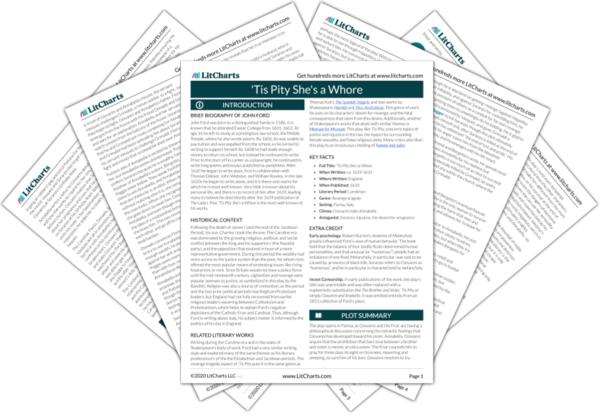Passion, Lust, and Bloodlust
The characters of ’Tis Pity are plagued with excesses of passion—both sexual lust and violent bloodlust—that overcome their rational judgment. As the play shows, both of these sorts of passion can easily overwhelm even the most seemingly noble characters and compel them to act in ways that deviate starkly from societal expectations, including incest and murder. Not only do these passions lead the characters to sin, they also lead them to their own destruction.
The…
read analysis of Passion, Lust, and BloodlustDesire vs. Duty
The Italy of ’Tis Pity demands the chastity and propriety of its citizens, strictly forbidding (among other things) incest, sex before marriage, and extramarital affairs. And yet, these forbidden relationships are the ones that Ford’s characters most desire. As a result, Ford portrays his characters as locked inside unresolvable conflicts between their desires and duties, doomed to disappoint themselves or others no matter what they choose.
The tension between desire and duty can best be…
read analysis of Desire vs. DutyInjustice
Throughout the play, characters seek recourse and revenge for various wrongs them (including incest, infidelity, and murder) and turn to systems of justice both official and unofficial. However, in seeking retribution, these systems of justice prove ineffective, as the men who supposedly administer justice prove immoral and corrupt themselves, thereby complicating the moral message of the play. The woeful inadequacy of all systems of justice in the play ultimately suggests that the social norms and…
read analysis of Injustice
Religious Piety vs. False Idols
Christian religious beliefs are the lens through which the characters in ’Tis Pity judge their own behavior and the behavior of others. However, the moral complexity of navigating the conflict between their desires and the convoluted social and religious norms of their society means that the characters struggle to identify what is truly good in the eyes of God. Many characters fall victim to false idols and corrupted theological justifications for sin, which shows that…
read analysis of Religious Piety vs. False IdolsFemale Sexuality vs. Social Expectation
The women of ’Tis Pity give in to the various men who beg them for sex, but they do not themselves initiate relationships out of wedlock. Despite this, they suffer the most for their actions—an unfortunate irony. The importance of sexual modesty in the society they live in is one of the great injustices of the play, as it constitutes an obvious double standard around male and female sexuality. By highlighting how disproportionately women are…
read analysis of Female Sexuality vs. Social Expectation






